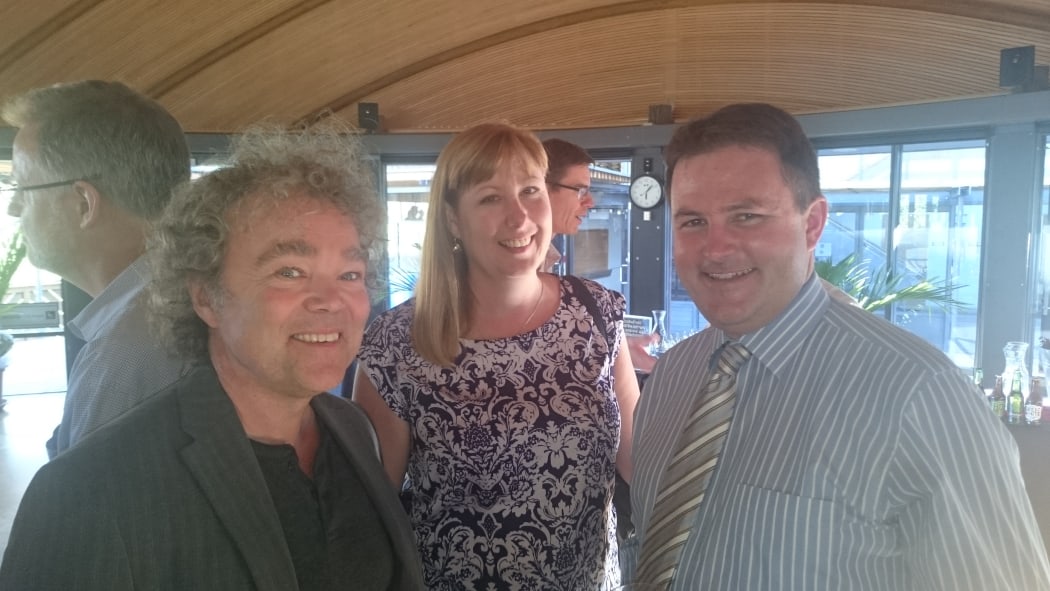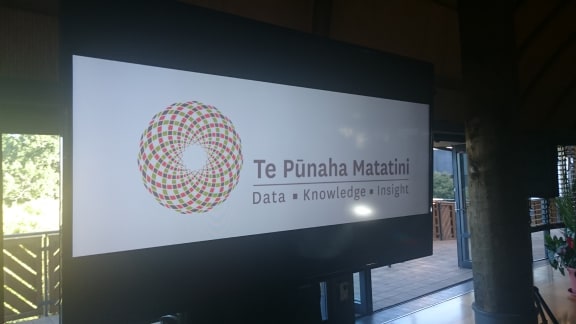by Veronika Meduna Veronika.Meduna@radionz.co.nz
'We want to go right from the data through to how you make decisions about the way we manage the world around us.' _Shaun Hendy

From left to right: Mark Gahegan, Laurie Knight, and Te Pūnaha Matatini director Shaun Hendy. Photo: Sarah Hikuroa
Te Pūnaha Matatini, a new Centre of Research Excellence focusing on complex systems and networks, is taking the idea of multi-disciplinary research to a new level. Economists team up with ecologists, physicists explore questions in biology, and mathematicians worry about the health of the environment.
The centre’s director, Shaun Hendy, says Te Pūnaha Matatini literally means ‘a meeting place of many faces’, but he sees it as a metaphor for complexity. By bringing together researchers from a wide range of disciplines, he hopes the team will develop new approaches for transforming complex data into insights for making better decisions.
Essentially, is it about understanding networks – regardless of whether they play out in the environment, society or business. “Traditionally or economic models are either very macro and high level and don’t have a lot of detail in them, or they are very low level and very much about individual businesses. In between there’s a complex space where networks of businesses and people interact.”
Shaun Hendy has long been interested in networks and how they can be applied in innovation, and to that end he has worked with economists. “But then I realised that the people who have the best understanding of networks are ecologists because they’ve had to grapple with ecological networks for a long time and have developed a deep understanding of networks. That’s only recently been applied to economics.”

Photo: Sarah Hikuroa
The approach Te Pūnaha Matatini investigators take is to go beyond data mining. “That’s only one aspect,” says Shaun Hendy. “Then we want to build models that explain the data and then, beyond the models, the goal is to use those models to make decisions.”
The projects already underway include a collaboration with Predator-free New Zealand, and University of Canterbury mathematician Michael Plank is interested in exploring the impacts of commercial fishing on marine ecosystem. To that end, he is teaming up with University of Auckland anthropologist Melinda Allen. “We already have ecological models of population dynamics of fish species today, but anthropologists have data on historical catches from middens. We can use those to test our theories and models. It’s not something you can replicate now because fishing has had a huge effect on the state of the ocean and the state of the fish populations, but this data gives us a window into how it used to be and what it was like before there was this massive fishing pressure.”
Tava Olsen, at the University of Auckland’s business school, is exploring innovations in supply chain systems, or value chains. “It’s not just about moving goods from here to there but sometimes it’s more virtual when we’re thinking about services.”
For University of Auckland cosmologist Richard Easther, the interest lies in developing new ways of using big data well to help make policy decisions. “As a physicist, I’m looking for opportunities to apply the technology of physics to problems that aren’t physics.”
He says some of the deep questions that we’ll have to answer in the future may not come from physics but more likely from biology and social science.
“Understanding cities for instance. Cities are systems that are built out of small pieces but behave in large and complex ways. You’re never going to have a physical theory of the city that’s the same as the physical theory of an atom, but the style of thinking that physicists have has applications outside of physics.”
For Shaun Hendy, the ultimate goal is for New Zealand to make its own decisions.
'I’d like to think that we were making decisions that are very specific to ourselves, based on our understanding of our unique location in the world, our population, our history, who we are - and having that really inform our decision making.'

